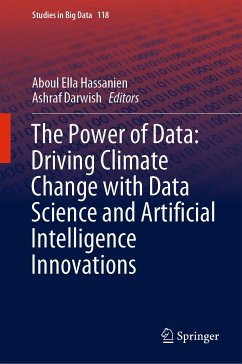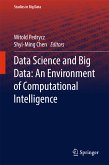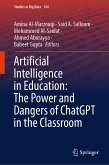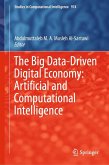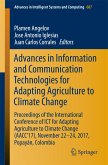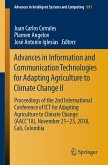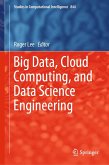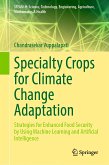The Power of Data: Driving Climate Change with Data Science and Artificial Intelligence Innovations (eBook, PDF)
Redaktion: Hassanien, Aboul Ella; Darwish, Ashraf
129,95 €
129,95 €
inkl. MwSt.
Sofort per Download lieferbar

65 °P sammeln
129,95 €
Als Download kaufen

129,95 €
inkl. MwSt.
Sofort per Download lieferbar

65 °P sammeln
Jetzt verschenken
Alle Infos zum eBook verschenken
129,95 €
inkl. MwSt.
Sofort per Download lieferbar
Alle Infos zum eBook verschenken

65 °P sammeln
The Power of Data: Driving Climate Change with Data Science and Artificial Intelligence Innovations (eBook, PDF)
Redaktion: Hassanien, Aboul Ella; Darwish, Ashraf
- Format: PDF
- Merkliste
- Auf die Merkliste
- Bewerten Bewerten
- Teilen
- Produkt teilen
- Produkterinnerung
- Produkterinnerung

Bitte loggen Sie sich zunächst in Ihr Kundenkonto ein oder registrieren Sie sich bei
bücher.de, um das eBook-Abo tolino select nutzen zu können.
Hier können Sie sich einloggen
Hier können Sie sich einloggen
Sie sind bereits eingeloggt. Klicken Sie auf 2. tolino select Abo, um fortzufahren.

Bitte loggen Sie sich zunächst in Ihr Kundenkonto ein oder registrieren Sie sich bei bücher.de, um das eBook-Abo tolino select nutzen zu können.
This book discusses the advances of artificial intelligence and data sciences in climate change and provides the power of the climate data that is used as inputs to artificial intelligence systems. It is a good resource for researchers and professionals who work in the field of data sciences, artificial intelligence, and climate change applications.
- Geräte: PC
- ohne Kopierschutz
- eBook Hilfe
- Größe: 7.66MB
Andere Kunden interessierten sich auch für
![Data Science and Big Data: An Environment of Computational Intelligence (eBook, PDF) Data Science and Big Data: An Environment of Computational Intelligence (eBook, PDF)]() Data Science and Big Data: An Environment of Computational Intelligence (eBook, PDF)129,95 €
Data Science and Big Data: An Environment of Computational Intelligence (eBook, PDF)129,95 €![Artificial Intelligence in Education: The Power and Dangers of ChatGPT in the Classroom (eBook, PDF) Artificial Intelligence in Education: The Power and Dangers of ChatGPT in the Classroom (eBook, PDF)]() Artificial Intelligence in Education: The Power and Dangers of ChatGPT in the Classroom (eBook, PDF)178,95 €
Artificial Intelligence in Education: The Power and Dangers of ChatGPT in the Classroom (eBook, PDF)178,95 €![The Big Data-Driven Digital Economy: Artificial and Computational Intelligence (eBook, PDF) The Big Data-Driven Digital Economy: Artificial and Computational Intelligence (eBook, PDF)]() The Big Data-Driven Digital Economy: Artificial and Computational Intelligence (eBook, PDF)161,95 €
The Big Data-Driven Digital Economy: Artificial and Computational Intelligence (eBook, PDF)161,95 €![Advances in Information and Communication Technologies for Adapting Agriculture to Climate Change (eBook, PDF) Advances in Information and Communication Technologies for Adapting Agriculture to Climate Change (eBook, PDF)]() Advances in Information and Communication Technologies for Adapting Agriculture to Climate Change (eBook, PDF)113,95 €
Advances in Information and Communication Technologies for Adapting Agriculture to Climate Change (eBook, PDF)113,95 €![Advances in Information and Communication Technologies for Adapting Agriculture to Climate Change II (eBook, PDF) Advances in Information and Communication Technologies for Adapting Agriculture to Climate Change II (eBook, PDF)]() Advances in Information and Communication Technologies for Adapting Agriculture to Climate Change II (eBook, PDF)73,95 €
Advances in Information and Communication Technologies for Adapting Agriculture to Climate Change II (eBook, PDF)73,95 €![Big Data, Cloud Computing, and Data Science Engineering (eBook, PDF) Big Data, Cloud Computing, and Data Science Engineering (eBook, PDF)]() Big Data, Cloud Computing, and Data Science Engineering (eBook, PDF)121,95 €
Big Data, Cloud Computing, and Data Science Engineering (eBook, PDF)121,95 €![Specialty Crops for Climate Change Adaptation (eBook, PDF) Specialty Crops for Climate Change Adaptation (eBook, PDF)]() Chandrasekar VuppalapatiSpecialty Crops for Climate Change Adaptation (eBook, PDF)178,95 €
Chandrasekar VuppalapatiSpecialty Crops for Climate Change Adaptation (eBook, PDF)178,95 €-
-
-
This book discusses the advances of artificial intelligence and data sciences in climate change and provides the power of the climate data that is used as inputs to artificial intelligence systems. It is a good resource for researchers and professionals who work in the field of data sciences, artificial intelligence, and climate change applications.
Hinweis: Dieser Artikel kann nur an eine deutsche Lieferadresse ausgeliefert werden.
Dieser Download kann aus rechtlichen Gründen nur mit Rechnungsadresse in A, B, BG, CY, CZ, D, DK, EW, E, FIN, F, GR, HR, H, IRL, I, LT, L, LR, M, NL, PL, P, R, S, SLO, SK ausgeliefert werden.
Hinweis: Dieser Artikel kann nur an eine deutsche Lieferadresse ausgeliefert werden.
Produktdetails
- Produktdetails
- Verlag: Springer International Publishing
- Seitenzahl: 255
- Erscheinungstermin: 11. März 2023
- Englisch
- ISBN-13: 9783031224560
- Artikelnr.: 67600615
- Verlag: Springer International Publishing
- Seitenzahl: 255
- Erscheinungstermin: 11. März 2023
- Englisch
- ISBN-13: 9783031224560
- Artikelnr.: 67600615
- Herstellerkennzeichnung Die Herstellerinformationen sind derzeit nicht verfügbar.
Aboul Ella Hassanien Prof. Aboul Ella Hassanien is Founder and Head of the Egyptian Scientific Research Group (SRGE) and Professor of Information Technology at the Faculty of Computer and Artificial Intelligence, Cairo University. Professor Hassanien's research interests are artificial intelligence, data mining, digital twining, bioinformatic, and drug discovery. Ashraf Darwish Dr. Darwish has served as Professor of computer science at Helwan University, Faculty of Science, Egypt, and Vice Chair of the Scientific Research Group in Egypt (SRGE) for research and international relations. His research interests are artificial intelligence and its applications.
Part 1: Artificial Intelligence in climate change Applications.- Chapter 1. Artificial Intelligence for Predicting Floods: A Climatic Change Phenomenon.- Chapter 2. Prediction of Climate Change Impact based on Air Flight CO2 Emissions Using Machine Learning: Towards Green Air Flights.- Chapter 3. The Impact of Artificial Intelligence on Waste Management for Climate Change.- Chapter 4. A Machine Learning-based Model for Predicting Temperature under the Effects of Climate Change.- Part 2: Emerging Technologies in Industry and Energy Sector.- Chapter 5. Prediction of CO2 Emission in Cars using Machine Learning Algorithms.- Chapter 6. Climate change: the challenge of Tunisia and previsions for renewable energy production.- Chapter 7. Clean Energy Management based on Internet of Things and Sensor Networks for Climate Change Problems.- Chapter 8. Digital Twin Technology for Energy Management Systems to Tackle Climate Change Challenges.- Chapter 9. The Role of Internet of Things in Mitigating the Effect of Climate Change: Case study: An ozone prediction model.- Part 3: Emerging Climate Change Technology in Agriculture Sector.- Chapter 10. Optimized Multi-Kernel Predictive Model for the Crop Prediction with Climate Factors and Soil Properties Optimized Multi-Kernel Predictive Model for the Crop Prediction with Climate Factors and Soil Properties.- Chapter 11. An Intelligent Crop Recommendation Model for the Three Strategic Crops in Egypt based on Climate Change Data.- Chapter 12. Cost Effective Decision Support System for Smart Water Management System.- Chapter 13. The Role of Artificial Intelligence in Water Management in Agriculture for Climate Change Impacts.- Part 4: Emerging Climate Change Technologies in Healthcare Sector.- Chapter 14. The Influence of Climate Change on the Re-Emergence of Malaria Using Artificial Intelligence.
Part 1: Artificial Intelligence in climate change Applications.- Chapter 1. Artificial Intelligence for Predicting Floods: A Climatic Change Phenomenon.- Chapter 2. Prediction of Climate Change Impact based on Air Flight CO2 Emissions Using Machine Learning: Towards Green Air Flights.- Chapter 3. The Impact of Artificial Intelligence on Waste Management for Climate Change.- Chapter 4. A Machine Learning-based Model for Predicting Temperature under the Effects of Climate Change.- Part 2: Emerging Technologies in Industry and Energy Sector.- Chapter 5. Prediction of CO2 Emission in Cars using Machine Learning Algorithms.- Chapter 6. Climate change: the challenge of Tunisia and previsions for renewable energy production.- Chapter 7. Clean Energy Management based on Internet of Things and Sensor Networks for Climate Change Problems.- Chapter 8. Digital Twin Technology for Energy Management Systems to Tackle Climate Change Challenges.- Chapter 9. The Role of Internet of Things in Mitigating the Effect of Climate Change: Case study: An ozone prediction model.- Part 3: Emerging Climate Change Technology in Agriculture Sector.- Chapter 10. Optimized Multi-Kernel Predictive Model for the Crop Prediction with Climate Factors and Soil Properties Optimized Multi-Kernel Predictive Model for the Crop Prediction with Climate Factors and Soil Properties.- Chapter 11. An Intelligent Crop Recommendation Model for the Three Strategic Crops in Egypt based on Climate Change Data.- Chapter 12. Cost Effective Decision Support System for Smart Water Management System.- Chapter 13. The Role of Artificial Intelligence in Water Management in Agriculture for Climate Change Impacts.- Part 4: Emerging Climate Change Technologies in Healthcare Sector.- Chapter 14. The Influence of Climate Change on the Re-Emergence of Malaria Using Artificial Intelligence.
